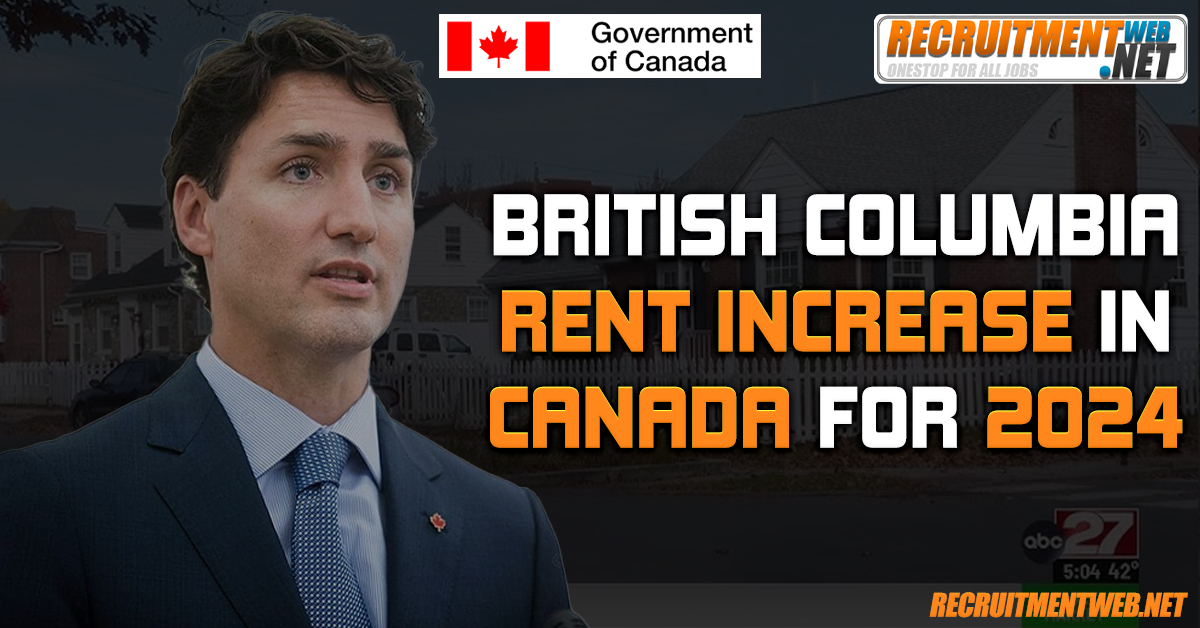Overview of British Columbia Rent Increase in Canada
British Columbia Rent Increase in Canada for 2024, British Columbia has set a maximum rent increase of 3.5% for residential tenancies. This regulation aims to balance the rising costs of living for both landlords and tenants. It’s important to understand the details of this limit and how it compares to any additional rent increases.

Understanding the 2024 Rent Increase Limit
The 2024 limit on rent increases in British Columbia is capped at 3.5%. This means that landlords cannot raise rent by more than this percentage for existing tenants. Importantly, this limit applies even if the rent includes utilities and other fees. So, regardless of any increases in operating costs, such as electricity or water, landlords must adhere to the 3.5% cap.
This decision reflects the provincial government’s effort to ensure that rent increases remain under the inflation rate, which has averaged around 5.6%. Keeping rent hikes below inflation helps protect renters from excessive costs. If you have questions about whether your tenancy is covered by this limit, consider contacting the Residential Tenancy Branch for guidance.
Annual Rent Increase Limit Versus Additional Rent Increase
The annual rent increase in BC for 2024 is strictly 3.5%, applying uniformly across most tenancies. However, there may be circumstances where landlords seek additional rent increases. These are typically rare and contingent upon specific conditions, such as significant repairs or improvements to the rental property.
In such cases, landlords must obtain approval from the Residential Tenancy Branch before implementing any additional increases beyond the standard limit. The process involves providing a detailed breakdown of costs and demonstrating the necessity of these additional expenses. As a tenant, it’s essential to be aware of these potential exceptions and to ensure any proposed increase is properly vetted and validated by the appropriate authorities.
Legal Obligations and Rights for British Columbia Rent Increase in Canada
In British Columbia, both landlords and tenants have specific rights and responsibilities regarding rent increases. Understanding these is crucial for maintaining a fair tenancy.
Landlords’ Responsibilities for Issuing a Notice of Rent Increase
Landlords in British Columbia must follow specific procedures to increase rent legally. They must provide tenants with a written notice at least three full months before the increase takes effect, ensuring communication is clear and timely. This notice can be delivered in person, by mail, or possibly by email, depending on the agreement.
The notice must clearly state the amount of the increase and the new total rent. The maximum allowable increase for 2024 is set at 3.5%. Landlords cannot exceed this cap unless they receive special approval from the Residential Tenancy Branch (RTB) for extraordinary expenses.
Failing to adhere to these regulations can render the rent increase invalid, and tenants are not required to pay the additional amount. It’s essential for landlords to be aware of and comply with these guidelines to avoid disputes.
Tenants’ Rights in the Event of Unlawful Rent Increase
Tenants have the right to dispute any rent increase that does not comply with the legal requirements. If you receive a notice of rent increase that appears unlawful, you can file a complaint with the Residential Tenancy Branch.
Upon receiving a disputed amount, tenants should continue to pay their current rent to avoid issues such as non-payment disputes. The RTB can investigate and make binding decisions regarding the validity of the increase.
It’s important for tenants to keep records of all communications with landlords, including copies of rent increase notices. If a tenant wins the dispute, landlords may have to revert to the previous rent rate and may owe compensation for overpayment if it occurred.
Factors Influencing Rent Increases for British Columbia Rent Increase in Canada
In 2024, rent changes in British Columbia largely hinge on economic metrics and regional housing dynamics. A key factor is the inflation rate which, along with other aspects, impacts how much landlords can raise rents.
Consumer Price Index and its Impact on Rent Caps
The Consumer Price Index (CPI) is a major player in deciding rent caps. It measures inflation by tracking the cost changes of essential goods and services. A higher CPI generally means rent caps might increase since rents are often adjusted to counteract inflation.
For 2024, the increase is capped at 3.5% to align with inflation projections based on CPI. This percentage ensures rents rise in tandem with living costs, providing balance between landlords’ needs and renters’ affordability. As CPI fluctuates, so might the rent caps in future years. Rent adjustments ensure stability for both property owners and tenants, tying closely to economic indicators like inflation.
Rental Market Trends and Housing Costs in Vancouver
Housing costs and market trends in Vancouver also dictate rent changes. With demand often outstripping supply, prices tend to rise. This trend is notable in Vancouver, where competitive markets drive rent adjustments.
In recent years, property shortages have fueled higher rental prices. For Vancouver renters, the market situation means constante pressure, affecting both affordability and availability of housing. While the government’s cap seeks to protect renters from excessive increases, underlying housing market trends like demand and supply still play a crucial role in shaping rental prices. Costly upgrades or enhancements to rental properties can also prompt requests for additional rent beyond the standard increase.
British Columbia Rent Increase in Canada Specific Situations Affecting Rent Adjustment
Rent adjustments in British Columbia for 2024 may vary in special situations, like in assisted-living facilities or when evictions occur due to renovations. It is important to consider how these scenarios impact both tenants and landlords.
Additional Rent Increase in Assisted-Living Facilities
In assisted-living facilities, landlords may seek additional rent increases. Regulations may allow for extra adjustments to cover rising costs in these specialized environments. Since these facilities often offer more than just housing, such as healthcare and personal support, the overall cost structure is different than standard rental units.
Tenants in these facilities need to understand what services are included in their rent and how these costs are adjusted yearly. Landlords may need to apply for permission to increase rent above the standard cap, usually by justifying increased operational costs related to care and amenities. Understanding these factors is crucial for both parties to ensure a fair agreement.
Evictions and Tenant Relocation Due to Renovation or Repurposing
Evictions can occur when a landlord decides to renovate or repurpose a rental property. This can lead to significant challenges for tenants, who may need to find alternative housing on short notice. The law generally requires landlords to provide adequate notice and, in some cases, compensation for the relocation of tenants.
Renovations can sometimes justify a temporary or permanent eviction if the work significantly disrupts living conditions. The eviction process must be handled according to local laws, ensuring that tenant rights are protected and fair treatment is provided. Understanding your rights and obligations can help navigate these situations effectively.
FAQ’s About British Columbia Rent Increase in Canada
In 2024, British Columbia has set regulations on how much landlords can increase rent, the process they must follow, and situations where tenants can respond to these increases. Below, common questions about rent increases in British Columbia for this year are answered.
How is the annual rent increase percentage determined in British Columbia for 2024?
The rent increase limit in British Columbia for 2024 is set at 3.5%. This percentage is determined by provincial regulations and is lower than the average inflation rate. It aims to balance the cost of living for tenants while allowing some increase for landlords.
What are the required procedures for landlords to notify tenants about rent increases in BC for 2024?
Landlords must provide tenants with a full three months’ notice before increasing rent. They are required to use a specific form called the Notice of Rent Increase. This ensures that tenants receive proper notification and the process remains transparent.
Can tenants dispute a rent increase in British Columbia, and if so, how?
Tenants can dispute a rent increase by applying to the Residential Tenancy Branch. This process involves submitting a formal request for a review, where tenants can argue against increases they believe are unfair or incorrect based on provincial regulations.
What are the historical rent increase rates in British Columbia leading up to 2024?
In the years leading up to 2024, historical rent increase rates have varied. Recent rates have been relatively moderate due to provincial interventions, often staying below the inflation rate. For 2023, the limit was set at 2%, reflecting a trend of controlled increases.
Are there any exemptions where landlords can exceed the standard rent increase limit in BC for 2024?
Landlords may apply for permission to exceed the standard rent increase limit under certain conditions, such as significant improvements or added services. These cases require approval from the Residential Tenancy Branch and must be well-documented to ensure fairness.
What are the differences between residential and commercial rent increases in British Columbia for 2024?
Residential rent increases have a set limit, like the 3.5% cap for 2024, while commercial rent increases are usually based on market conditions and specific lease agreements. The regulations for residential properties are more stringent to protect tenants’ rights.


